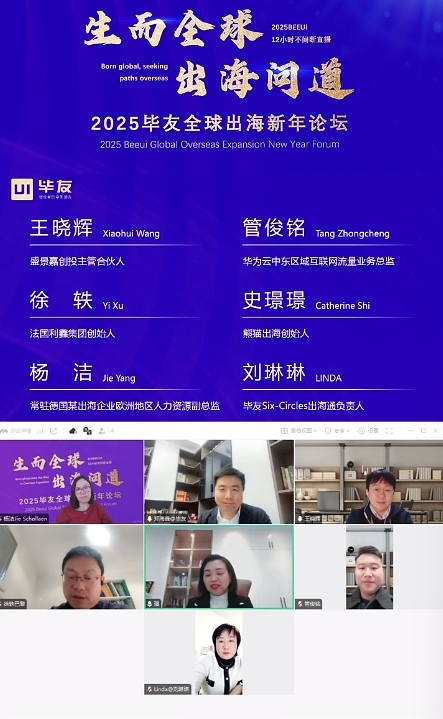Born to be global, go global and ask questions丨PDAEXSEA was invited to participate in the 2025 Biyou Global New Year Forum
PDAEXSEA
2025-01-20 08:48:10
Page view:1093
On the afternoon of January 18, 2025, PDAEXSEA Executive President Shi Jingjing was honored to be invited to participate in the "Born global, go global and ask questions - 2025 Biyou Global Overseas New Year Forum" hosted by Biyou.
In the overseas dialogue: the actual exploration path, risks and success of enterprises going overseas, together with Biyou founder and Baikun Capital founding partner Mr. Zheng Haifeng, Shengjing Jiacheng Fund Managing Partner Ms. Wang Xiaohui, Chairman of France Lixin Group Mr. Xu Yi, German senior human resources expert Ms. Yang Jie, Huawei Cloud Middle East Regional Director Mr. Guan Junming and Biyou Six-Circles Overseas Communication Head Ms. Liu Linlin, shared the problems and feelings encountered in actual cases based on their respective fields and experiences.

In the long process of helping Chinese enterprises go overseas, various situations have been experienced, with highlights of success and painful lessons of failure. Due to factors such as language barriers and changing policies, the countries in Southeast Asia have brought great challenges to the integration of Chinese enterprises. By 2024, the number of enterprises served by Panda Overseas will reach thousands, and a large number of valuable cases and practical experience have been accumulated.
Mr. Shi cited two examples of the difficulties and challenges encountered by enterprises going overseas.
A manufacturing enterprise in Guangdong went to Vietnam to take root, but because of ignoring the local logistics conditions, it had no choice but to choose air transportation, which caused the cost to rise sharply, offsetting the production cost advantages such as labor, so that the production cost in Vietnam was equivalent to that in Guangdong;
When a Zhejiang enterprise purchased land in Indonesia, it almost bought civilian land by mistake due to lack of in-depth understanding of local land policies. After our detailed land due diligence, it changed to park land to effectively reduce costs.
Based on this, Mr. Shi gave valuable advice. Before going overseas, enterprises must make thorough preparations, conduct in-depth project feasibility analysis, fully grasp policies and regulations, accurately calculate various costs, and successfully complete project construction and commissioning. It is particularly important not to blindly copy the successful experience of China, but to deeply integrate into the local environment and culture, and formulate a development strategy that fits the reality according to local conditions.
Finally, Mr. Shi also suggested that enterprises going overseas should be good at using the power of professional institutions to avoid pitfalls on the road to going overseas.

Mr. Xu pointed out that going overseas faces cultural barriers and used France as an example to illustrate its changes. It shows that the European market has great potential, especially the food supply chain has great prospects. It calls for the food processing and pre-prepared food industries to enter Europe, and at the same time emphasizes that going overseas requires competitiveness and market understanding.
Mr. Yang gave suggestions on organizing local teams for different types of overseas companies from the perspective of human resources. Greenland companies require human resources to build teams from 0 to 1, while the requirements of M&A companies for human resources are to promote the integration of different cultures between the Chinese headquarters and local teams.
Mr. Guan introduced the Huawei Cloud ecosystem and said that he saw many opportunities for companies to go overseas in the Middle East. Huawei hopes to work with more outstanding companies to go overseas, overcome challenges with the help of domestic solutions, and jointly cope with complex environments.
Mr. Liu suggested that small and medium-sized enterprises should give priority to exporting their products overseas, and sell first and then build a team. He emphasized the need to understand the common sense of exporting overseas, conduct research and adaptation on the export qualifications of the agricultural and food sectors, conduct detailed research in the early stage, and control risks.
In the Q&A session, Mr. Shi gave a detailed answer to the question "What issues should be paid attention to when intending to build a localized electric vehicle company in Thailand?"
Mr. Shi first pointed out that for the landing of factories, the Eastern Economic Corridor of Thailand has obvious location advantages and is the choice of many Chinese companies, but it has now become saturated, and the choice space in this area is relatively small. Enterprises need to consider more in terms of site selection. At the same time, in terms of certificates of origin, Thailand requires that the proportion of origin of products must be nearly 40%. Therefore, Mr. Shi specifically reminded that before investing, it is necessary to clarify the product structure and distribution plan of the production process.
Finally, Mr. Shi hopes that when 2025 comes, our domestic entrepreneurs will be able to go overseas with courage and successfully occupy their own place overseas.
"Born to be global, go abroad to ask questions-2025 Biyou Global Overseas New Year Forum"
This forum covers three chapters: strategy, market, and practice, and deeply analyzes the key nodes and development trends of the entire process of going global.
The main guests and topics are as follows:

In this feast of collision of ideas, PDAEXSEA actively listens to the opinions of all parties and shares its own experience. We deeply realize that under the wave of global economic integration, the overseas journey has both opportunities and challenges. It is for this reason that we are more determined to help companies go overseas.
This conference is a valuable opportunity for learning and communication, allowing us to meet many like-minded partners.
Here, PDAEXSEA sincerely hopes to continue to work hand in hand with more partners in the future, give full play to their respective advantages, integrate diverse resources, pave a broad road to the international market for more companies that dream of going overseas, and help them shine brightly on the global business stage.


